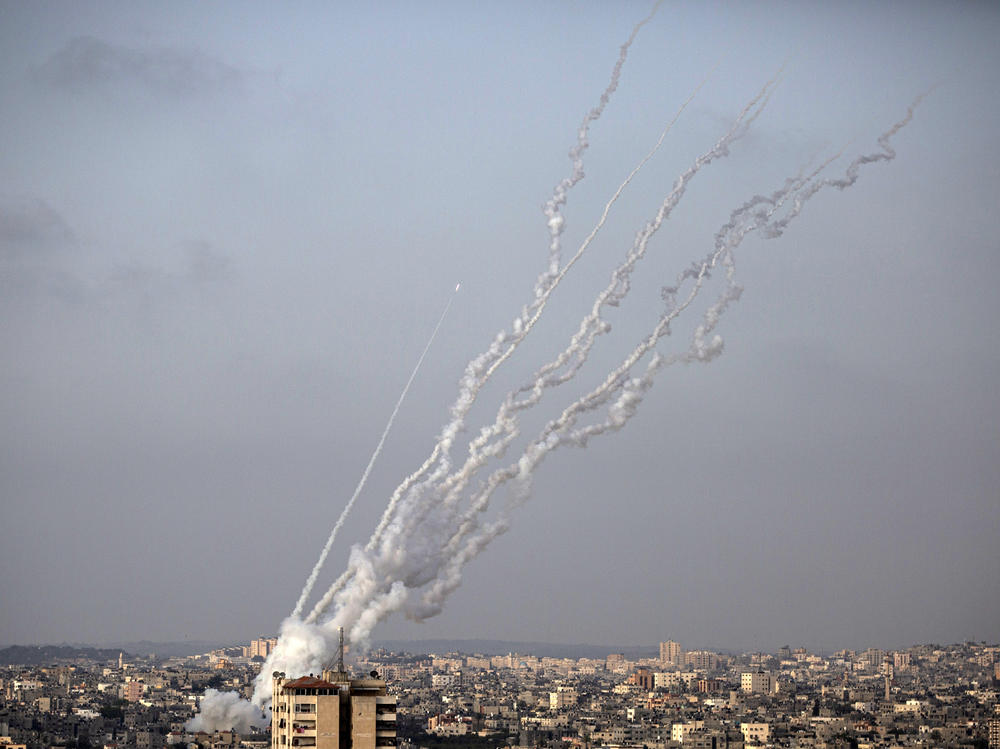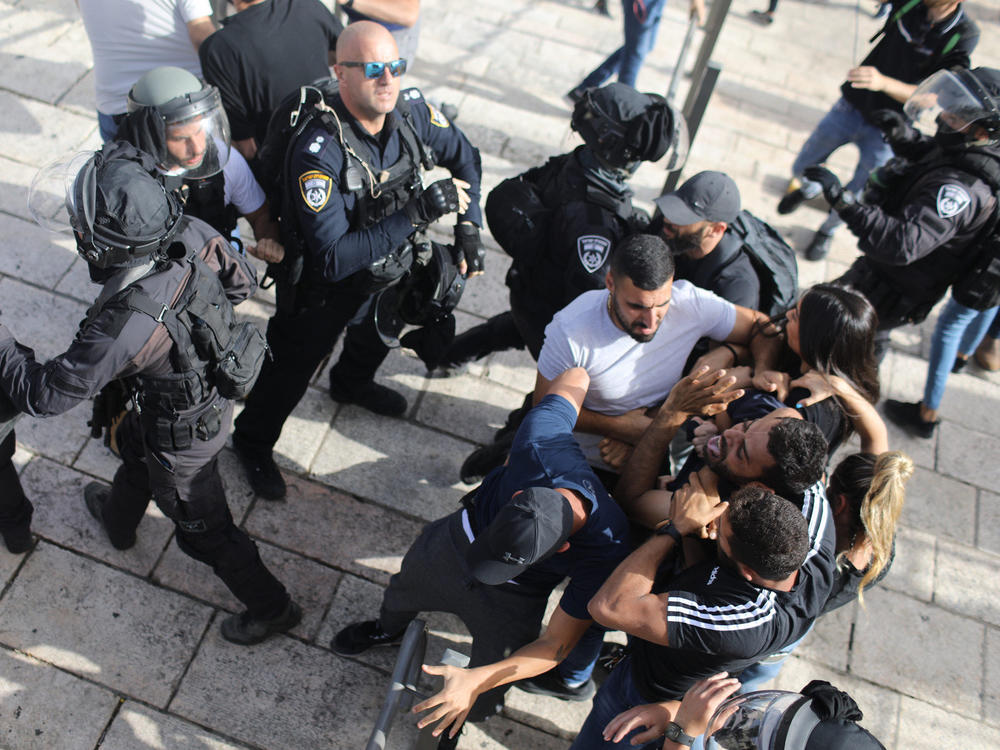Section Branding
Header Content
20 Reported Killed In Israeli Airstrikes On Gaza After Hamas Fires Rockets At Israel
Primary Content
Updated May 10, 2021 at 4:10 PM ET
JERUSALEM — A new round of Israeli-Palestinian violence continued to escalate Monday as Palestinian militants fired rockets from Gaza toward Jerusalem and Israel responded with airstrikes.
Palestinian health officials said 20 people, including nine children, were killed in the strikes. The Israel Defense Force would not confirm those figures, but said three Palestinian militants were killed in a targeted attack.
The exchange followed clashes in Jerusalem Monday that left nearly 400 Palestinians wounded, as Israeli police used stun grenades, rubber-coated bullets and water cannons at the Al-Aqsa Mosque compound, located on what Muslims call Haram al-Sharif and Jews call the Temple Mount.
More than a dozen police officers were also hurt.
The violence prompted organizers to cancel the annual Jerusalem Day march through the Old City, which marks Israel's capture of East Jerusalem in the Six-Day War of 1967. They did so after the government barred Jewish nationalists from marching through Palestinian areas of the city.
Yaakov Novik, a march organizer, said it was the first time in decades that officials prevented them from marching through Damascus Gate, a major entry point to the Old City and a Palestinian gathering area.
"It is succumbing to terror," Novik told NPR.
Monday's clashes with police brought the number of Palestinian wounded in recent days to about 600, according to the Palestinian Red Crescent emergency medical service. The majority of those hurt received hospital treatment. At least seven suffered serious wounds.
The Israel Defense Force said the militant group Hamas fired more than 40 rockets from Gaza into Israel Monday, triggering alarms in both Jerusalem and the nearby city of Beit Shemesh. The IDF said an anti-tank missile fired from Gaza left an Israeli civilian "lightly injured."
More violence had been predicted to come later Monday, when Jewish religious nationalists and youths were poised to walk in the annual Flag March — part of the Jerusalem Day celebrations.
"Jerusalem is currently a powder keg that could explode," Amos Gilad, a former head of Israeli military intelligence, told Army Radio on Monday, according to local media outlets, as he urged officials to cancel the march.
Israeli political and security officials decided to redirect Flag March participants away from their annual route through Palestinian neighborhoods of the Old City, instead rerouting it through the Jewish quarter.
Late Sunday, police sprayed foul-smelling water on Palestinian boys and youths who were gathering, some throwing rocks and water bottles.
The U.S. and other international entities are urging both sides to deescalate tensions and halt the violence.
"We are extremely concerned about ongoing confrontations in Jerusalem, including on the Haram al-Sharif/Temple Mount and in Sheikh Jarrah," a State Department spokesman said Friday, referring to Palestinian areas of Jerusalem.
But the violence continued on Saturday as skirmishes broke out with police outside the mosque, where tens of thousands of Muslims had gathered for the Night of Destiny. The holy night, also called the Night of Power, marks the day when the Quran was revealed to the Prophet Muhammad.
Even before Jerusalem Day, Palestinians have been upset by Israeli police tactics during Ramadan. The holy month of fasting and prayer, which ends this week, has routinely been marred by nighttime skirmishes among Palestinians, police and anti-Arab Jewish gangs. Palestinians call the police actions an affront; police have said their goal was to assert crowd control.
Some Israeli commentators have accused new police leadership of an excessive response, saying Prime Minister Benjamin Netanyahu is focused on his own political survival in Israel's fraught political landscape.
With Jerusalem on edge, Israeli authorities have postponed a court hearing that could force some Palestinians to turn over their homes in the city to a Jewish settler group. In that long-running dispute, the settlers claim ownership rights stemming from a land purchase in the 1800s. But many Palestinians have lived there for decades after being displaced during the 1948 war that immediately followed Israel's creation.
The U.S. has expressed concerns about those possible evictions because Jewish settler groups are motivated ideologically to establish a Jewish majority in Palestinian areas.
NPR's Bill Chappell reported from Washington, D.C.
Copyright 2021 NPR. To see more, visit https://www.npr.org.


